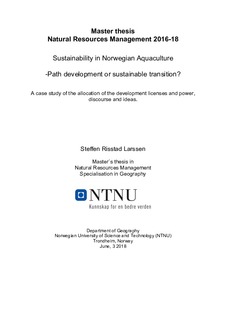| dc.description.abstract | The aim of this study has to been to gain a deeper understanding of the development of the allocation process of the development licenses in norwegian aquaculture. The licenses have to differing main purposes, to create economic growth and to strengthen sustainability. The development licenses are supposed to contribute to this through the application of new technology.
The Norwegian aquaculture industry has gone through different phases since it´s origin and started out with a regional development perspective. However, since the perspective of the future of the oil- and gas industry have changed in the recent years due to climate change, the aquaculture industry has been addressed as a new source for national economic growth. The industry has had a solid economic growth the last decades. On the other side, since the 1980´s the industry have had various problems with pollution and other environmental problems.
As the industry is on its way into a national matter, actors, stakeholders, networks, goals and arguments regarding the industry change. With this background, it has been important to adress power, discourses, narratives and ideas in the time when the industry has been set to change. This also makes the process an interesting case regarding to which extent the industry develops into a sustainable direction.
Critical discourse analysis has been applied to analyse how central actors discuss central issues as sustainability, economic growth, the governments role and how technology should be applied.
The results show a great diversity of manifestations of power, discourses and narratives, and how coalitions have seemed to form around certain suggestions for sustainable technologies. It also shows that this process has set a direction for further sustainability in the industry. The government and the public management have played an important role in this development. | nb_NO |
